Full-Time MBA Battle: San Francisco vs. Seattle
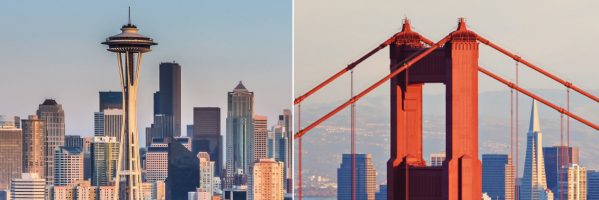
Whether it’s 49ers vs the Seahawks or Apple vs Microsoft, it may seem like there are a lot of differences between San Francisco and Seattle. Putting these minor dissimilarities aside, however, and you’ll find common ground between two of the northwest’s biggest cities: Both metros are known as top locations for prospective MBAs looking to earn an advanced business degree full-time. Continue reading…
The Best Part-Time MBA Programs You Can Find in Seattle
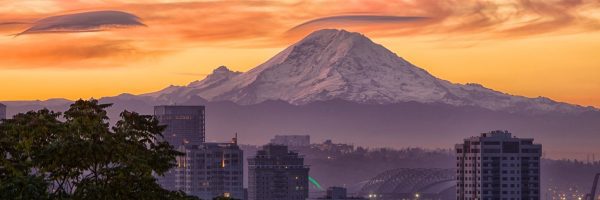
For those who feel stuck in a middle management position, getting an MBA is a great way to get a leg-up on competition and put yourself in the running for higher-level opportunities. Unfortunately, a 9-to-5 job does not leave much time to devote to full-time learning.
However, the majority of MBA programs offer flexible, hybrid, or part-time options to accommodate all sorts of schedules. Below, we offer a rundown on the three best Seattle part-time MBA programs.
The Best Seattle Part-time MBA Programs
Seattle Pacific University School of Business, Government and Economics
At the Seattle Pacific University School of Business, Government and Economics, a full-time career does not have to deter motivated professionals from pursuing higher education. SPU’s part-time program consists of evening and weekend classes, and is designed to fit into a busy schedule. The university markets the program specifically to established professionals looking to integrate valuable MBA knowledge and skills into their current position.
The 45-credit program consists of ten advanced courses and five elective courses. Selecting an emphasis can help professionals tailor their education to their specific business needs. Students can choose any of the following emphases: Human Resource Management, Finance, Management, Cybersecurity, Data Analytics, Social and Sustainable Business, or Information Systems Management.
SPU’s part-time program might appeal to professionals who prioritize integrity and wish to make a positive contribution to their workplace and community. The university requires at least two ethics courses, and underscores the importance of morality in business.
Foster School of Business—University of Washington
The UW Foster School of Business has several options for aspiring MBAs who cannot commit to a standard full-time program. Foster offers an Evening MBA, a Hybrid MBA, and an Executive MBA to accommodate various lifestyles.
Forster’s Evening MBA takes three years to complete. Students in this program have an average of almost seven years of work experience, making this track a great option for more seasoned professionals looking to enhance their contributions at their jobs, or perhaps looking to make a late career change.
The Executive MBA (EMBA) at Foster may also be the right choice for those looking for a program that is compatible with full-time work and life obligations. Though not limited to executives, the EMBA is specifically designed for seasoned professionals seeking knowledge they can apply in their professional lives right away. The 21-month program provides the option to take classes weekly or monthly, to meet the needs of those who might have to commute.
If finding time to commit to on-campus courses seems difficult, Foster’s Hybrid MBA might be a good fit. The program involves quarterly in-person sessions, and the rest of the coursework takes place online.
Albers School of Business and Economics—Seattle University
Seattle University’s Albers School of Business and Economics offers students in the Professional MBA (PMBA) the chance to pursue their degree part-time. This program is ideal for students who want to tailor customize their education to fit their interests and career goals, as electives comprise two thirds of the 54 required credits. Students on the PMBA track must have a minimum of two years of work experience. Graduates of this program have gone on to high-level positions at companies like Nike and Microsoft.
New Amazon Headquarters Bidding Race Begins, with 50,000 New Jobs on the Line

By October 19, bids for the newest Amazon headquarters (dubbed HQ2) will close. For the eCommerce giant, it’s another benchmark for an already historic year.
Following its outward commitment to more hiring and the landmark purchase of grocery store chain Whole Foods earlier this summer, Amazon just announced it will be establishing a new non-satellite headquarters outside of Seattle for the first time, which is expected to bring 50,000 jobs to a select city that bids for hosting duties. With the announcement, Amazon notes, “We are looking for a location with strong local and regional talent—particularly in software development and related fields—as well as a stable and business-friendly environment to continue hiring and innovating on behalf of our customers.”
In the six-page Request for Proposal form, which can be read here, Amazon notes a preference for North American cities that have the following:
- “Metropolitan areas with more than one million people.”
- “A stable and business-friendly environment.”
- “Urban or suburban locations with the potential to attract and retain strong technical talent.”
- “Communities that think big and creatively when considering locations and real estate options.”
Assuming Amazon does elect to build in a city with those population restrictions, there are only nine possible U.S. locations: New York City, Los Angeles, Chicago, Houston, Philadelphia, Phoenix, San Antonio, and Dallas. Three Canadian cities—Toronto, Montreal, and Vancouver—also hit the qualifying population figure.
In Philadelphia, Mayor Jim Kenney quickly announced the city’s intent to enter the bidding war. Chicago Mayor Rahm Emanuel also seems to be close to the effort. However, there may be reason to believe that Texas will be the eventually landing spot for HQ2, where 53-year old CEO Jeff Bezos spent much of his youth.
In a statement, Bezos said, “We expect HQ2 to be a full equal to our Seattle headquarters. Amazon HQ2 will bring billions of dollars in upfront and ongoing investments, and tens of thousands of high-paying jobs. We’re excited to find a second home.”
Local Economic Growth
Amazon notes that the host city will receive a boon beyond more lucrative job opportunities. In its announcement, the company, which employs nearly 400,000 people worldwide (not including short-term seasonal employees), detailed its financial impact in Seattle, which “resulted in an additional $38 billion to the city’s economy–every dollar invested by Amazon in Seattle generated an additional $1.40 for the city’s economy overall.”
As well, the company created more than 40,000 direct jobs in the Emerald City, and 53,000 additional jobs “as a result of Amazon’s direct investments,” according to the U.S. Bureau of Economic Analysis. In the Request for Proposal form, the company promises it “will hire as many as fifty thousand (50,000) new full-time employees with an average annual total compensation exceeding one hundred thousand dollars ($100,000) over the next ten to fifteen years, following commencement of operations.”
According to Wall Street firm Needham & Co., Amazon is expected to control 50 percent of all U.S. online sales by 2021. The ever-increasing market dominance has earned Amazon a fairly negative reputation, but has done little to deter growth.
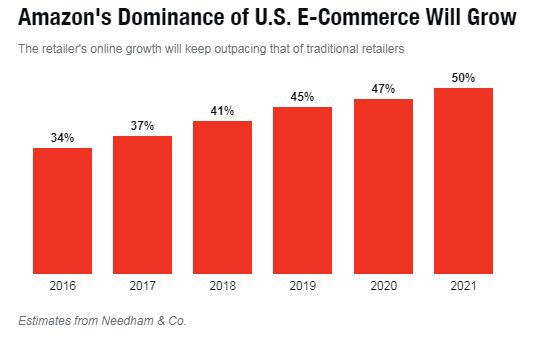
Via Fortune
Seattle has also been witness to years of skyrocketing housing costs due to the immense economic growth. The Seattle Times notes “the median price hit $730,000, up nearly 17 percent from a year ago” for houses. Amazon and the rest of the Seattle corporate community may not be the only players responsible for the unusually high prices, but it is an inescapable part of the equation.
In a recent interview, Columbia Business School professor Rita McGrath said that Amazon may be looking for a location with less staggering housing costs.
“It’s hard to attract people if they can’t afford the housing available locally,” she said.
The Amazon MBA Impact
Last year, we highlighted Amazon’s massive effect on the MBA job market. The company creates a direct pipeline from its MBA internship program to full-time employment, which should rapidly increase with the creation of HQ2. In a previous interview with the Financial Times, Miriam Park, the Amazon Director of University Programs, highlighted the company’s recruitment strategy:
“The Amazon recruitment process is designed to ensure we hire top candidates with high-growth potential whatever their background may be. As part of this we recruit current MBA students and MBA alumni for permanent and internship opportunities worldwide and see MBAs as an important part of our leadership development. We value people who can balance long-term strategic thinking with tactical execution, and who have the ability to make data-driven decisions.”
The internship programs open opportunities for MBAs to join the company as senior product managers, operations analysts, and more. Throughout the Request for Proposal form, Amazon frequently reiterates its desire to build in a location that has a strong academic culture, writing, “a highly educated labor pool is critical and a strong university system is required.”
Amazon will formally announce where it will build HQ2 next year.
Deciding Which Seattle Marketing MBA Is Right for You
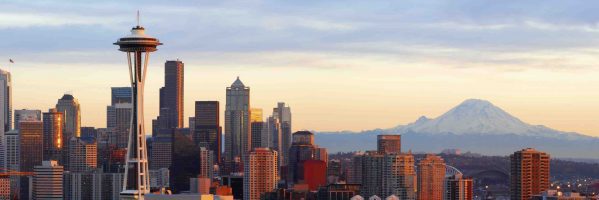
Seattle is, easily, one of America’s fastest growing cities. Just in one year, from 2015 to 2016, the city’s population increased by 21,000 people, according to The Seattle Times. That’s 57 people a day, on average.
It’s no surprise people are flocking to Seattle. Amazon, Nordstrom, and Starbucks have headquarters there—and Amazon has been busy hiring like crazy. Companies like Microsoft and Boeing are only contributing to this growth too. But beyond the economic and population growth, Seattle is beautiful. Famous for its lush mountains, Seattle provides a view of Mount Rainier from just about any point in the city.
Its progressive policies—like providing a $15 minimum wage and legalizing the use and sale of cannabis—also make the city appealing for young people who are curious about where to start their family or career.
It’s the perfect place to build a life—after that MBA you’ve been thinking about. Three programs, in particular, offer competitive marketing MBA programs. Perhaps they’ll land candidates a job in the tech industry where Seattle employees are the “second-best paid techies,” in the U.S, according to The Seattle Times.
Seattle MBA Programs with a Focus in Marketing
Albers School of Business and Economics — Seattle University
The Albers School of Business and Economics dates back to 1976 when the school was renamed to honor the contribution of Eva and George Albers. Since then, it’s garnered a number of accolades. Most recently, The Princeton Review included the school in its 2017 “Best Business Schools” publication. Albers offers different MBA programs, including an Early Career MBA, a Professional MBA, and a Leadership Executive MBA.
The Professional MBA program can be customized to meet a student’s needs. Two thirds of the required 54 credits consist of electives, so candidates can choose the classes they need to meet their career goals. Candidates can make marketing their discipline. The school offers 12 marketing electives. This program allows students to take two of the school’s 10 graduate certificates as part of their electives. Marketing is on that list.
The business school also gives specialized master degrees for accounting, business analytics, and finance. Its Master of Science in Business Analytics (MSBA) can give marketing candidates a competitive edge in learning data skills.
Foster School of Business — University of Washington
The Foster School of Business at the University of Washington has been around for 100 years. Yep, since 1917. In 2007, it took up the Foster name in honor of Michael G. Foster, who donated $36.5 million through his foundation.
This money went toward building the campus’ state-of-the-art facilities, a major perk for a public university. And this devotion the school has for its students has proven successful: Nearly 3,000 alumni have founded companies. U.S. News World & Report ranked its full-time MBA program number one overall in the Northwest and number nine overall among public universities.
The curriculum ensures candidates understand every facet to business: accounting, finance, strategy, and, of course, marketing. But the second year of the full-time program allows students to hone in on their chosen skill. For marketing MBAs, the program offers 12 electives, including one exclusively on data.
Seattle Pacific University School of Business, Government and Economics
The Seattle Pacific University School of Business, Government and Economics started teaching business in 1977. Its Christian background influences the way the school teaches business. Ethics and service are major themes.
The MBA program features seven emphases: cybersecurity, data analytics, finance, human resources management, information systems management, management, and social and sustainable enterprise. Marketing is a required skill in the curriculum. Marketing is included in the pre-MBA courses required to obtain the degree. For advanced courses, marketing analysis is required. The data analytics emphasis is a good place for those interested in marketing to look into. Data is key in marketing. Numbers tell a bigger story than one might imagine.
2017 Forté Forums Scheduled in 12 Cities Beginning August 14

It’s August, which means it’s almost time for the Forté Forums. These free events are hosted by the Forté Foundation, a nonprofit consortium of leading companies and top business schools committed to advancing the role of women in business. Scheduled for 10 U.S. cities as well as Toronto and London beginning on August 14, they are designed to help women learn more about the value of the MBA.
Whether you are a college student looking to explore options for the future, have been in your job for a few years and are thinking about a change, or are looking for a way to catapult yourself to the next level in your career, the Forté Forums are for you.
Choose to attend a forum in a city near you, and you can learn more about how the MBA can help you advance in your career, expand your earning potential, or provide opportunities to study abroad. With more than 100 leading business schools in attendance, you can also learn more about different programs directly from the school representatives who know them best.
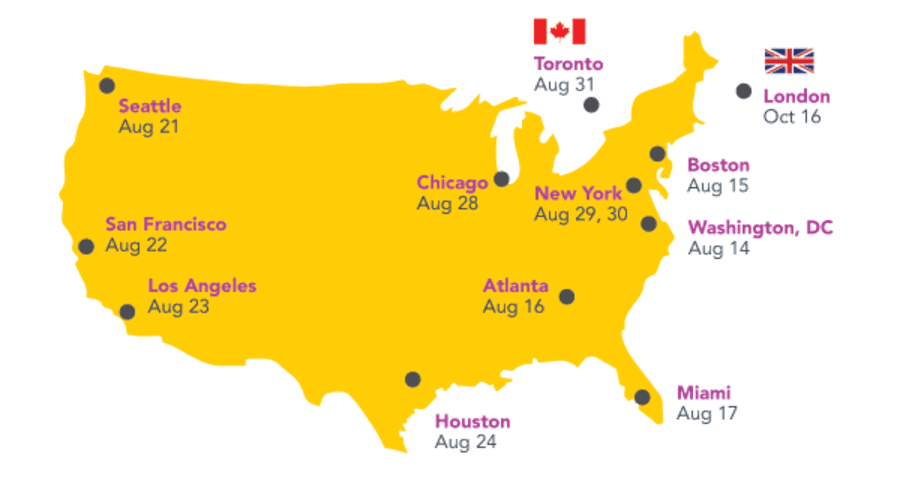
The Forté Forums also draw leading MBA businesswomen from a range of industries and career stages, eager to share their experiences and provide advice and guidance. And they give you a chance to network with other high-achieving women interested in learning more about the MBA. Former attendees of the Forté Forums report that women they’ve met at the events have become part of a lasting peer support network.
Last but not least, the forums can help you begin to think about how to finance your MBA, offering valuable information about Forté’s scholarship opportunities, as well as many other funding sources.
Whether you know nothing at all about business school and want to see what it’s all about—or you’re planning to apply this fall and want to connect with others doing the same, don’t miss out. Register for a nearby Forté Forum today!
2017 Forté Forums Calendar:
August 14th: Washington, DC
August 15th: Boston
August 16th: Atlanta
August 17th: Miami
August 21st: Seattle
August 22nd: San Francisco
August 23rd: Los Angeles
August 24th: Houston
August 28th: Chicago
August 29th and 30th: New York City
August 31st: Toronto
October 16th: London
Learn more about the Forté Forums, including how to register.
This article has been edited and republished with permissions from Clear Admit.
The Best Accelerated MBA Programs Available in Seattle

When you need to earn your MBA in less than two years, some schools offer the opportunity to take an accelerated MBA path. These programs typically require full-time attendance but have been designed to be completed in twelve to eighteen months. Over the past few years, accelerated MBA programs have grown in popularity, offering MBA students who already have a background in business a chance to deepen their knowledge and skills in a relatively fast manner.
For MBA candidates living in Seattle, there are two primary accelerated MBA options. Continue reading…
